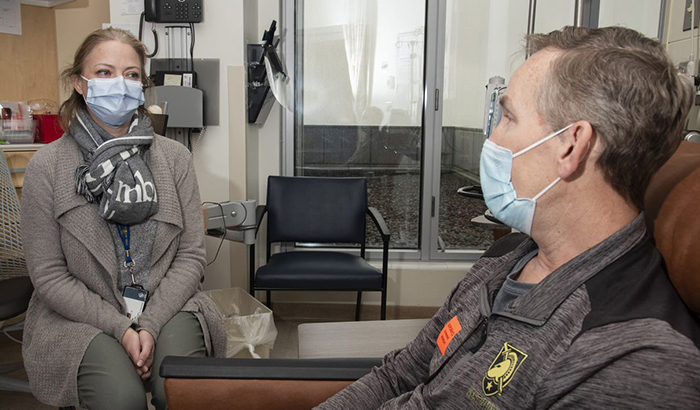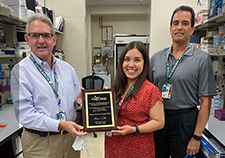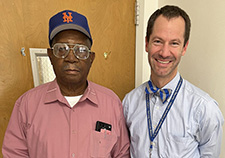Office of Research & Development |
 |


Dr. Julie Graff, an oncologist at the Portland VA, consults with Army Veteran David Atkinson, whose aggressive prostate cancer was treated based on genetic testing. (Photo by D. Michael Moody)
June 11, 2021
By Nancy Volkers
For VA Research Communications
"The first step is a conversation with your cancer doctor (oncologist) about the purpose of the testing and its possible benefits in selecting your cancer treatment, as well as possible harms and limitations."
Prostate cancer is one of the most common cancers in VA patients. The disease most often affects older men, age 65 and above.
VA has been partnering with the Prostate Cancer Foundation to ramp up the use of precision oncology to treat Veterans with metastatic prostate cancer—disease that has spread from the prostate gland to other areas of the body. Precision oncology involves giving genetic tests to patients and using the results to help guide treatment.
VA Research Currents spoke with two experts to learn more about how Veterans with advanced, or metastatic, prostate cancer can be helped through genetic testing and precision oncology. The answers below were provided by Dr. Julie Graff, an oncologist with the Portland VA Health Care System and Oregon Health and Science University; and Dr. Maren Scheuner, a physician and geneticist at the San Francisco VA Health Care System and the University of California, San Francisco.

VA researchers using AI to decide best treatment for rectal cancer

VA center training the next generation of researchers in blood clots and inflammation

AI to Maximize Treatment for Veterans with Head and Neck Cancer

Veterans help find new cancer treatments
VA Research Currents: What is the purpose of genetic testing for men with metastatic prostate cancer?
Genetic testing looks for variations in a person’s genes. Finding gene variations can help with decisions about cancer treatment. Finding gene variations can also help to understand why cancer developed and how best to find cancers early or to prevent them altogether.
What are genes and how do they contribute to cancer?
Humans have about 25,000 genes. Your genes are found inside the cells of your body. Genes are made of DNA. The DNA is a code for a set of instructions that control how your body grows, develops, and maintains itself. DNA changes that are harmful to your health are called mutations. Gene mutations that promote cell growth can lead to cancer. Gene mutations that prevent the repair of DNA mistakes can lead to cancer. Mutations in genes that repair mistakes in DNA, like the BRCA2 gene are important causes of prostate cancer.
How do gene mutations happen?
Gene mutations can happen for many reasons. For example, exposure to smoking, the sun, radiation, viruses, or certain chemicals can sometimes cause gene mutations. Sometimes gene mutations happen by chance, as cells normally grow and make new cells.
Most gene mutations are acquired throughout your lifetime and can happen in any cell. Therefore, acquired gene mutations are only present in some cells of the body. Fortunately, our cells can fix most acquired gene mutations, but not all. Cancers have many acquired gene mutations.
Some gene mutations are inherited from our parents. Inherited gene mutations usually are found in every cell of the body. Inherited gene mutations cannot be fixed by our cells. Rarely, an inherited gene mutation causes tumors or cancers. Clues to an inherited gene mutation include younger age of cancer diagnosis and family members with the same or related cancers. For example, an inherited BRCA2 gene mutation increases the risk for prostate, breast, ovarian, and pancreatic cancers, and melanoma.
How does your healthcare provider get a sample of your DNA for genetic testing?
The first step is a conversation with your cancer doctor (oncologist) about the purpose of the testing and its possible benefits in selecting your cancer treatment, as well as possible harms and limitations. Your oncologist might refer you to a genetics specialist to help guide the genetic testing process.
Ways to collect cancer cells to look for acquired gene mutations:
Ways to collect normal cells to look for inherited gene mutations:
What are the possible benefits of genetic testing?
If an acquired or inherited gene mutation is found, you might benefit from new drugs that can increase survival in men with metastatic prostate cancer. For example, PARP inhibitors are used to treat metastatic prostate cancer with acquired or inherited BRCA2 gene mutations. You can also learn about other cancer risks and begin screening for early detection or make lifestyle changes to prevent those cancers. [Editor’s note: Read the story of an Army Veteran with prostate cancer who was helped through genetic testing.]
If an inherited gene mutation is found, there is a chance that other family members have the same gene mutation, like your children, siblings, or parents. Sharing this information with family might benefit them. They can consider genetic testing for themselves to learn about their cancer risks and possible options for early detection and prevention.
What are the possible harms of genetic testing?
There are some physical harms possible from a tumor biopsy or a blood draw. There are other possible harms from genetic testing for inherited gene mutations. If you learn that you have an inherited cancer gene mutation, this may increase anxiety or distress or cause some concern about talking with family about your results. Your oncologist may refer you to a genetics specialist to help cope with these types of issues if they come up.
Some patients worry that health insurance companies or employers will discriminate against them if they are found to have an inherited gene mutation. The GINA law protects Americans from discrimination by health insurers or employers. However, life, disability and long-term care insurers can ask about your inherited gene mutations to decide if they will insure you or how much you will pay for this kind of insurance.
Does an inherited gene mutation mean that my prostate cancer was not related to military service?
Cancers are caused by a mix of both inherited and acquired gene mutations. The contribution from each can vary from person to person. Not all men with inherited gene mutations will develop prostate cancer. This is how we know other factors, like military exposures, are important. For example, Agent Orange is a risk factor for prostate cancer no matter if a man has an inherited gene mutation or not. If you receive VA disability benefits for your prostate cancer linked to Agent Orange, and you have an inherited gene mutation for prostate cancer, your genetic test results cannot take away your risk from exposure to Agent Orange.
What are the limitations of genetic testing?
Not all gene mutations will be discovered due to limitations of the testing. Not all gene variations found will be an important cause of your prostate cancer or help with choosing your cancer treatment. The laboratory may not be able to interpret some gene variants found. This uncertainty about the results can be difficult for some people.
If you would like to know more about genetic testing for yourself or a loved one with prostate cancer, speak with your physician or other health care provider.
VA Research Currents archives || Sign up for VA Research updates